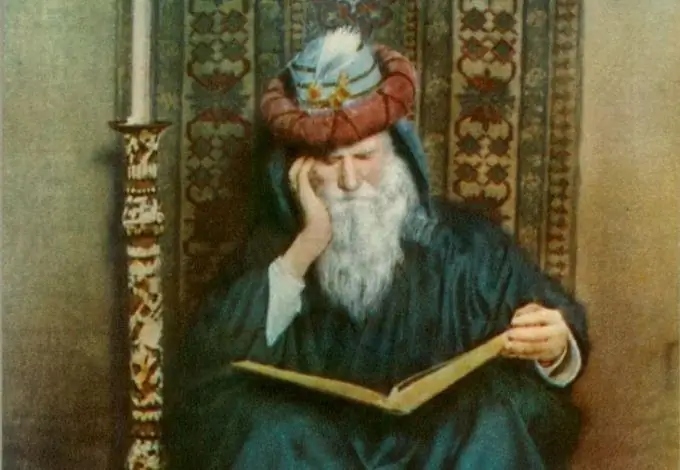- Author Antonio Harrison harrison@cultureoeuvre.com.
- Public 2023-12-16 07:44.
- Last modified 2025-01-22 21:44.
Omar Khayyam's poems have come down to us through the centuries. Today everyone can enjoy his wise quatrains. But not everyone knows that Khayyam left his mark not only in poetry. In fact, he was a prominent mathematician and astronomer of his day.

Khayyam as a scientist
Omar Khayyam was born in the Iranian city of Nishapur in 1048. It is highly probable that his father belonged to the artisan class. This is evidenced by the surname itself - Khayyam. It translates as "tent master".
Khayyam's family had enough funds to pay for education for their child. In his youth, the future poet studied at the Nishapur madrasah. And at that time, this institution was considered aristocratic - future major officials were trained here. Then Omar moved to Samarkand, where he soon turned from a student into a teacher - many of those around him were amazed by his erudition. A few years later, Khayyam left Samarkand and settled in Bukhara. Here he manages to get a job in the book depository, and he gets the opportunity to calmly compose scientific treatises.
A very important year in the biography of Omar Khayyam is 1074. This year he was invited to the capital of the Seljuk state - Isfahan. The Seljuk sultan himself, Melik Shah, became interested in the learned husband. The Sultan praised Khayyam's abilities and made him his advisor. And then Khayyam became the head of the palace observatory. At that time, she was one of the most advanced in the world. And this allowed Khayyam to deeply study astronomical science and develop the Jalali calendar. This calendar was more accurate than the Julian and Gregorian.
Khayyam also made a significant contribution to algebra. Two algebraic treatises of Khayyam the mathematician have come down to us. In one of them, the definition of algebra as the science of solving equations is given for the first time. And Khayyam, in fact, was the first to propose a new concept of the concept of number, under which, for example, irrational numbers were suitable.
In 1092, after Melik Shah died, Khayyam's position was shaken. He lost his authority, the widow of Melik Shah treated the sage in a completely different way from her late husband. First, Omar was forced to do his work at the observatory for free, and then he had to return to his native Nishapur altogether. Here he lived his last years. Omar Khayyam died in 1131.
Khayyam as a poet
Khayyam was really an outstanding person for his time. He lived a fruitful, vibrant and long life. The paradox is that, as a poet, Khayyam was not widely known to his contemporaries. Year after year, he wrote aphorisms with a special structure of rhyme (rubai), but apparently did not attach serious importance to them. Most likely, many of them were impromptu. There is still debate about how much of the rubaiy Khayyam composed.
Today we might not know Khayyam as a poet, if the notebook with his verses had not once ended up in the hands of the 19th century English writer Edward Fitzgerald. He translated the Rubai into Latin and English. These translations (more precisely, free transcriptions) have gained immense popularity. Khayyam's poetry can be defined as wise, but at the same time simple and easy. In his poems, he showed himself to be an apologist for hedonism; in many rubaiyas there are calls to enjoy every moment, not to deny himself guilt, carnal love and other simple pleasures.






